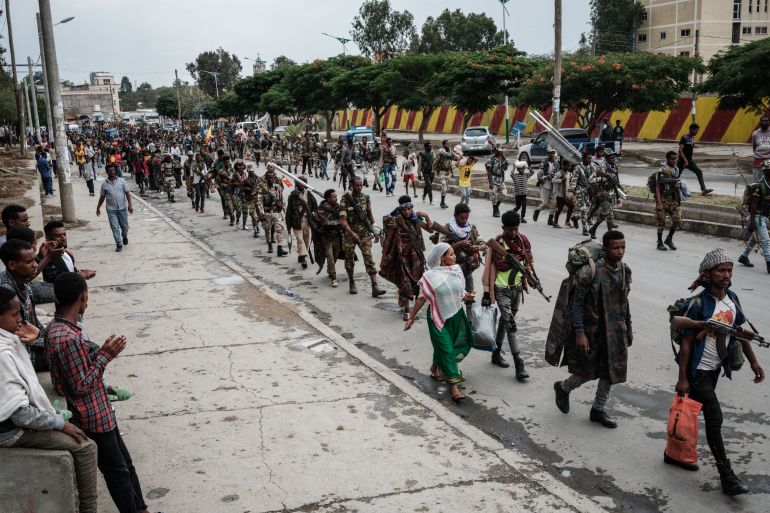Over 120 killed in Ethiopia’s Amhara region, officials say
Tigrayan forces reject allegations by local officials in Amhara region they killed scores of villagers earlier this month.

Doctors and local officials have said more than 120 civilians were massacred in Ethiopia’s Amhara region earlier this month, but forces from neighbouring Tigray rejected allegations they were responsible.
The killings in Chenna village, near the town of Dabat, took place in early September, according to Sewnet Wubalem, the local administrator in Dabat, and Chalachew Dagnew, spokesperson of the nearby city of Gondar told the Reuters news agency on Wednesday.
Keep reading
list of 3 itemsMore than 210 killed in violence in western Ethiopia: Commission
Ethiopia’s Tigray crisis ‘set to worsen dramatically’: UN
“So far we have recovered 120 bodies. They were all innocent farmers. But we think the number might be higher. There are people who are missing,” Sewnet said.
Mulugeta Melesa, head of the hospital in Dabat, told the AFP news agency, “There were 125 dead in Chenna village … I saw the mass grave myself.”
Mulugeta added that residents were “still searching for dead bodies around the area and counting is still going on”.
Chalachew, the Gondar city spokesperson, also said he had visited the burial area in the village and that children, women and elderly were among the dead.
He was quoted by Reuters as saying the killings were during the Tigrayan forces’ “short presence” in the area, and it was now under the control of the Ethiopian federal army.
The accounts could not be independently verified.
The Tigrayan forces later issued a statement rejecting what they called a “fabricated allegation” by the Amhara regional government and denying any involvement in the killing of civilians.
“We categorically reject claims of our forces’ involvement in the killing of civilians,” said the statement, which was posted by spokesman Getachew Reda on Twitter.
It also called for “an independent investigation into all atrocities” in the region.
The Ethiopian Human Rights Commission – a state-affiliated but independent body – said it was “alarmed” by the reports and that law enforcement was investigating to confirm the number and identities of the victims.
Northern Ethiopia has been racked by conflict since November 2020 when Prime Minister Abiy Ahmed sent troops into Tigray to remove the regional governing party, the Tigray People’s Liberation Front (TPLF), a move he said came in response to TPLF attacks on army camps. The TPLF, which dominated national politics until Abiy came to power in 2018, said federal forces and its allies launched a “coordinated attack” against it.
Though Abiy, the 2019 Nobel Peace Prize winner, promised a swift victory, fighting has dragged on, with myriad reports of massacres and atrocities, including rape and extrajudicial killings, and hundreds of thousands of people suffering famine.
In June, in a stunning turnaround in the conflict, the Tigrayan forces retook Tigray’s capital Mekelle and federal forces largely withdrew.
Since then, the Tigrayan forces have launched offensives into neighbouring Amhara and Afar regions, displacing hundreds of thousands of people and triggering allegations of summary executions and indiscriminate shelling.
The Tigrayan forces have denied those charges, insisting they are merely trying to break what they describe as a humanitarian blockade on Tigray and prevent pro-government forces from regrouping.
Chenna residents reported that the Tigrayan forces controlled the village in late August before fighting against pro-government troops broke out in early September, Sewunet, the local administrator, told AFP.
The Tigrayan forces then shot dead civilians across multiple days in early September before retreating, he alleged.
At least some of the wounded were taken to the university hospital in the city of Gondar.
“The dead bodies are not coming here but there are some wounded civilians here,” said Ashenafi Tazebew, the Gondar hospital’s vice president.
“We have received close to 35, 36 civilians but I am not sure they are all from the Chenna massacre. Most of them have gun wounds,” he said.
“Some of them, their families are already dead and they are asking to go to the funerals” even though they need treatment, he added.
The United Nations, United States and others are pressing for an immediate ceasefire and a path to talks to end a war that has killed thousands of people in Africa’s second-most populous country.